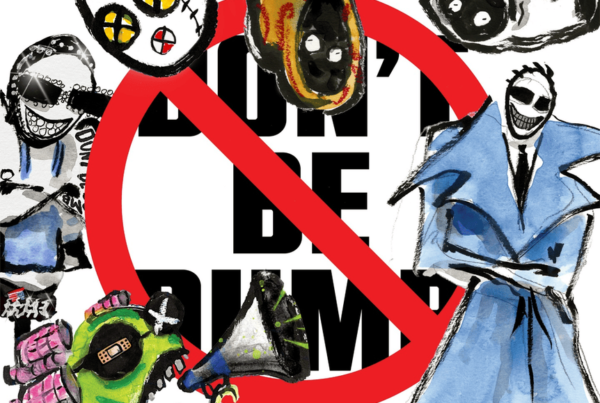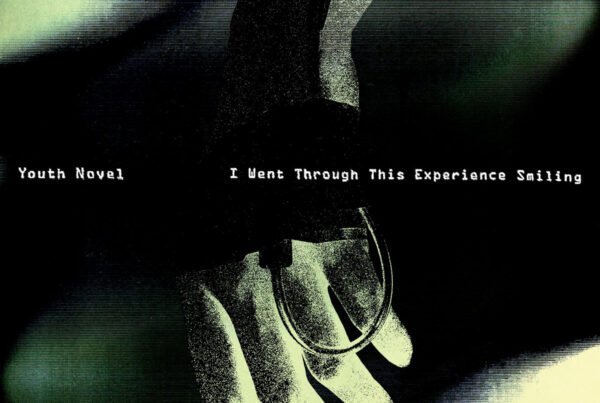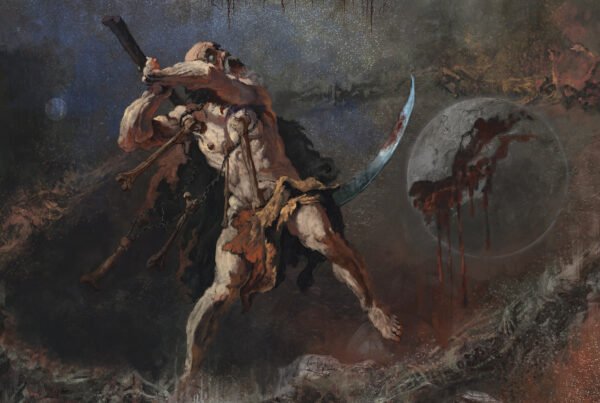Ingurgitating Oblivion pushes the limits of avant-garde death metal on their stunning Ontology of Nought
Release date: September 27, 2024 | Willowtip Records | Facebook | Bandcamp
I’m not going to beat around the bush here; I’ve been waiting a long time to hear a new album from Ingurgitating Oblivion. Back in the bygone days of 2017, I stumbled upon their then-new third album, Vision Wallows in Symphonies of Light, and found myself thoroughly taken with the band’s ambitious, adventurous take on avant-garde death metal. Their deft blend of jagged death metal with loose, tasteful jazz was a breath of fresh air at the time, and I was curious to see how far they could take their refreshingly unique sound. And now, after seven long years, the follow-up Ontology of Nought is finally here. And since we’ve all waited long enough, I’ll happily say right here and now that Ingurgitating Oblivion has successfully outdone themselves.
Sonically, a lot of what made Vision Wallows… so intriguing has been carried over. The German duo (plus a legion of guests) is still peddling a sound that feels like a wild, distinctly European blend of Gorguts, Imperial Triumphant, Alkaloid, and maybe even shades of Ebonylake. The twin roots of dissonant death metal and cerebral, tastefully orchestrated jazz are still the focal points, but Ontology of Nought shows some noticeable growth in scale and ambition. The previous album was already a major undertaking with four monolithic tracks weighing in around 52 minutes, but their new opus dwarfs that. The band has presented here five lengthy tracks, none below 10 minutes in length. Each one by itself could present as a fully developed suite packed full of ideas and experiments, but they also bleed together in ways that make them feel more like movements in a single 73-minute piece.
Moreover, the sound of the band has broadened since their last work. Obviously, the band still makes great use of the core of guitar from main members Florian Engelke and Norbert Müller, bass, and drums (once again provided by the masterful hired gun Lille Gruber of Defeated Sanity fame). The base metal of the band is rooted in churning dissonance, as the above comparisons may imply. But throughout, elements of crushing yet sometimes melodic technical death metal flourish, brutal slamming chugs, and some callbacks to the genre’s thrashy roots ensure that, were this album only a metal album, it would still be an absolute blast.
But in addition, the jazz influences of the previous work has been increased exponentially, and extra instrumentation also adorns much of the album. Each track feels adventurous and expertly orchestrated by way of recorders, flutes, piano, vibraphones, and even Tibetan singing bowls. Vocals run the gamut from harsh mid-range growls to choir-like singing to spoken word when applicable, sometimes contained within single tracks. The interplay of all these elements varies track to track, but it creates a rich sonic tapestry where each moment hides some sort of delight. After several listens, I’m still picking up at least a couple subtle details I hadn’t previously noticed, making Ontology of Nought an album that’s happy to reward the patience it demands from listeners.
In fairness, the album does require some patience, and not just due to its substantial run time. Ingurgitating Oblivion‘s songwriting approach is very flowy and loose, tending to run like a river from idea to idea, sometimes placidly and other times in a rage. As a point of reference, think of the earliest works of Opeth, but considerably more bludgeoning and deranged. There’s not much in the way of hooks and refrains to be found here, making for an album that’s decidedly not catchy, and the transitions between the feelings can happen in the flash of an eye. At first brush it may feel chaotic and disjointed, but within a couple listens the constant shifts in dynamics, tempo, and style fall into place and feel second nature and logical.
Take the way opener “Uncreation’s Whirring Loom You Ply with Crippled Fingers” runs, quietly fading in on narration and sparse chords, saving any semblance of heaviness for a sudden drop several minutes in. The track jumps between raging angular riffs and stretches of quiet, uneasy jazziness, often crossing over by way of Gruber’s frenetic but loose drumming and the occasional solos, some featuring the blistering fret(less) work of guest soloist Tom ‘Fountainhead’ Geldschläger (formerly of Obscura, among many other projects), careening back and forth until a quiet spoken word outro gives way to the next track. It’s a lot to take in at first, but it’s positively exhilarating.
That approach maintains across the whole album, but Ingurgitating Oblivion paces the album in a way where no element ever feels like a quickly added throwaway thought. Noticeably, every track ends on a respectably long quieter outro that could vary between menacing (the drones of the second track) to alien (the mantra of track three) to beautiful (the flutes that close the album). Internally, every song feels like it was crafted with great care and attention to balance. For example, the second track, “To Weave the Tapestry of Nought” (yes, every track title is awesome), dedicates a large amount of its 18-minute runtime to a protracted jazz break that feels lush, yet at times ominous and threatening. This is balanced well by the heavily metal-oriented “The Blossoms of Your Tomorrow Shall Unfold in my Heart”, which has the shortest runtime but feels absolutely punishing for all but the intro and outro. And the mouthful that is the fourth track (“…Lest I Should Perish with Travel, Effete and Weary, as My Knees Refuse to Bear Me Thither”) pretty much entirely eschews growls in favor of the choir-esque singing of Ava Bonam, adding some robotic distortions towards the tracks end. Musically, though, the band runs anywhere from lush, slightly Eastern serenity to classy lounge jazz to crushing doom across its ten-minute length.
The amount of balance Ingurgitating Oblivion gives to their light and soft sides is very admirable and sets them apart well from similar bands that use their more experimental asides as light seasoning for their death metal. Both the metal and jazz aspects are given similar footing, to the point that you could at times call them an avant-garde jazz project messing with death metal as easily as the inverse. In a lot of ways, Ontology of Nought feels like a modernized version of the same approach King Crimson relied on during their John Wetton-fronted 1972-74 run. The dynamics are so stark and sudden that they can be shocking at first listen. Ugliness and beauty are both possible at any given time. And the loose-sounding complexity occasionally makes it unclear as to whether you’re hearing full-on improv or some of the most rigidly composed material imaginable. I’m nigh on positive it’s the latter for Ingurgitating Oblivion, but the uncertainty makes for some of the most exciting music you’ll hear all year.
It’s wild how much Ingurgitating Oblivion has managed to turn the whole paradigm of avant-garde death metal on its head, to the point I was doing the stereotypical metalhead ‘ooh’ face to sudden smooth jazz breaks as often as I was for riffs and grooves. The fact that such a diverse, expansive album works so effectively and feels so cohesive is nothing short of a marvel. Even the way the band parceled out singles for the album feels like it was carefully handled to signpost how the album is supposed to be seen as one whole piece in how they gave us piecemeal fragment of the immense closer “The Barren Earth Oozes Blood, and Shakes and Moans, to Drink Her Children’s Gore”. In pieces the track sounds great, but as a whole it’s on a completely different level.
Music aside, the production of the album is outstanding, feeling suffocating and massive when the metal is running full tilt, while the quietest moments feel sparse and airy, even somewhat liminal in the sheer empty sonic space conveyed. Likewise, the album artwork and lyrical musings (where I could gather them at least) are tasteful and pensive. The front cover calls to mind a sense of antiquity and classy elegance, while also making me think of the ‘ancient’ roots of death metal (that is, the cover of Death’s Scream Bloody Gore if rendered as a beautiful statue). The lyrics, where I could pick work them out, are poetic, intelligently written musings on philosophy and existence, and match up to the emotionally evocative music expertly. It’s just a perfectly complete package of an album, and the only real downside I can pick out is the sheer impenetrability of the first listen or two. But hey, you’re not about to let that stop you, right?
It may have taken a long while for Ontology of Nought to come together, but it very much feels like an album that was given seven years of care and attention before release. It could have come off as a pretentious, bloated mess of an album in the wrong hands, but Ingurgitating Oblivion has polished their approach to a shine on every single facet, ensuring that none of the experiments included were duds. Somehow, it handily outdoes the masterful previous album, and if anything I’m even more excited to see where they go next. 2024 has been a killer year for dissonant death metal between bands like Ulcerate, Defacement, or labelmates Ceremony of Silence and Pyrrhon, and now that crown has another gem. Ontology of Nought is quite an astounding journey through a whole cosmos of avant-garde death metal and experimental jazz. It’s an awful lot to take in, sure, and maybe it’s too dense to just throw on when I want some cool metal, but it’s an experience well worth listening to a multitude of times, unravelling its mysteries bit by bit. Bravo, Ingurgitating Oblivion. Take as long as you need for the next album, I’m certain it’ll be worth the wait all over again.






